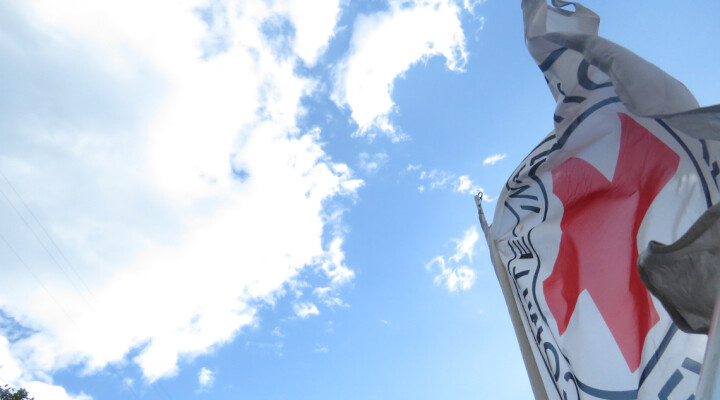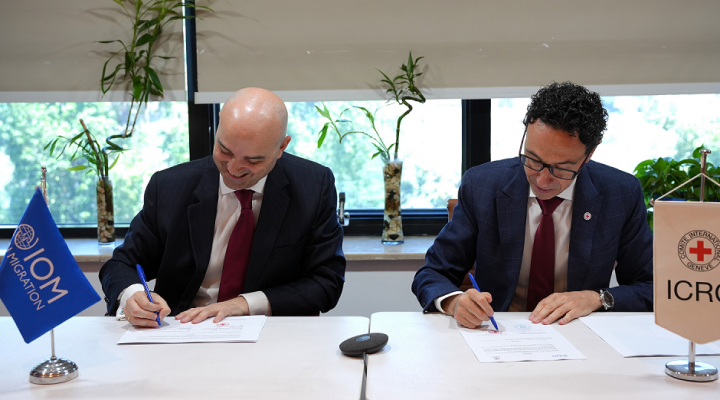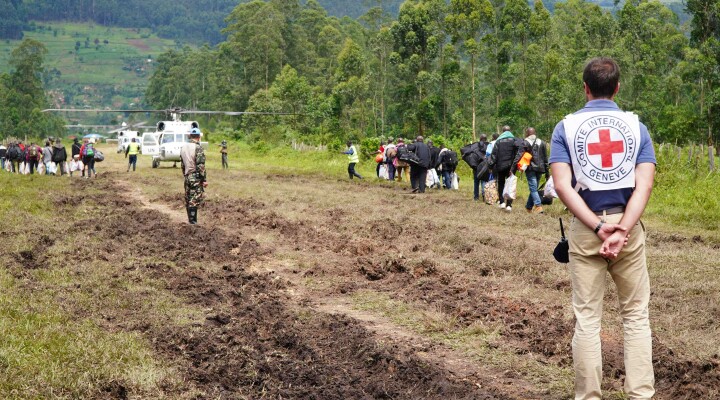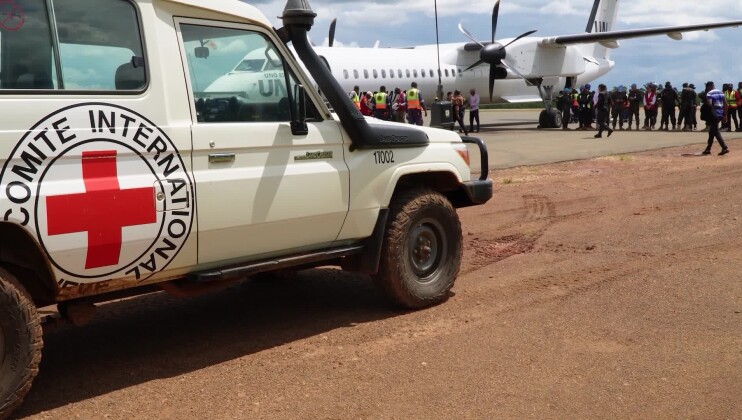Love Behind Bars In The Time Of Covid-19
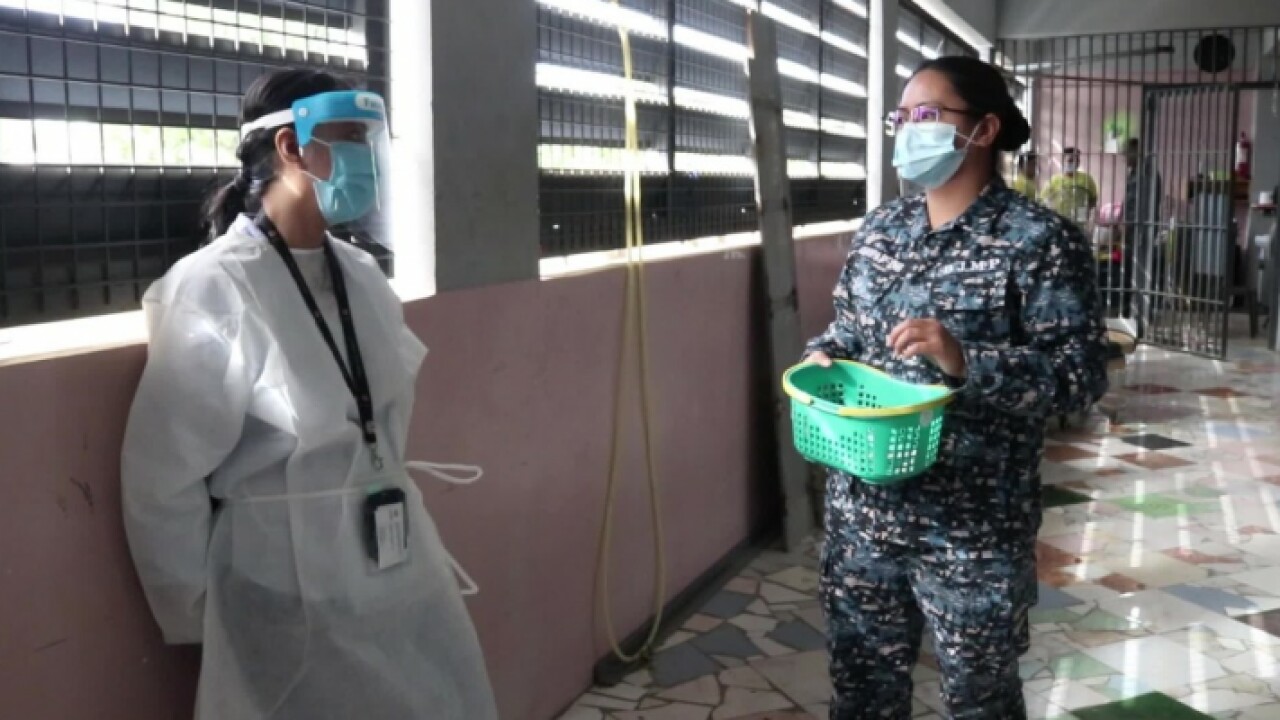
This is a modal window.
Even before the COVID-19 pandemic, detainees around the world struggled to establish or maintain contact with their loved ones. With public health restrictions such as the suspension of face-to-face visits in many countries over the past year, the challenge has increased tenfold.
In the Philippines for nearly a year now, family visits in detention facilities have been suspended since the pandemic hit the country. The visits were halted by detention authorities in March 2020 as a precaution for the often extremely congested jails and prisons, alongside stricter infection prevention measures, though COVID-19 cases had been reported in Philippine detention facilities starting April 2020.
But thanks to the advent of the Internet, along with donations of 89 tablet devices with SIM cards and call/ Internet surfing load by the International Committee of the Red Cross (ICRC), detainees in 31 jails of the Bureau of Jail Management and Penology (BJMP) and COVID-19 isolation facilities are able to connect with loved ones—even only electronically and for short periods of time—during this difficult period.
“The BJMP’s e-dalaw program has been there for a while now but because of the pandemic, the need for it intensified. They had set up a system for it but many of the jails lacked the devices. The ICRC as a support (to the e-dalaw program), provided tablets. The number of tablets and load to be donated depend on the size of the jail,” said Victa Garde-Lipio, ICRC detention field officer.
The tablet devices, on some occasions, are also utilized by the BJMP to help facilitate electronic court hearings for pre-trial detainee; or for their other programs such as medical consultations and drug dependency evaluations.
In Plaridel Municipal Jail in Bulacan province, north of the capital Manila, there are 140 male detainees (as of 4 February 2021) taking turns to use two tablet devices to speak with their loved ones. The service is available seven days a week but is scheduled per dormitory so all detainees may avail.
“The donation of two tablets and load boosted our e-dalaw program which in turned had a huge impact to our detainees as it helped alleviate their loneliness after the suspension of visits. It allowed them to know what’s happening with their loved ones. It’s as if their loved ones can still visit them,” said Chief Insp. Arnel Sarino, the jail warden, adding that some detainees even get to help their children with their modules through the calls.
To ensure that the service will not be a source of infection, the ICRC provided poster guidelines on disinfection, and hygiene items to some jails. Detainees must wash their hands with soap and water and disinfect with alcohol before using the device. They must also wear masks during the calls. The device is also cleaned after every use.
Detainee *Michael says the daily video calls though brief allow them to learn what’s happening outside, and their family, to know what’s happening inside the jail, if they are healthy or sick.
“It’s very important to us, especially during this pandemic, when we could not speak to them in person. We could not hug or kiss them. We could not say in person what we wish to say.”
“Because of e-dalaw, we are able to maintain connection. We can say what we need to say even if they are afar. Which is why somehow, my family is happy. They know how I am or how things are in the dormitory,” he said.
In the last quarter of 2020, the BJMP began allowing families to bring food, money and medicines for detainees. The BJMP has started preparations in some jails for the new normal of visits but its administration has not yet advised when face-to-face visits would resume.
*not his real name to protect his identity
For further information, please contact:
Allison Lopez (in Manila), mobile: +63 908 868 6884
Follow ICRC Philippines on facebook.com/ICRCph
LOGLIST
Location: Plaridel Municipal Jail, Bulacan province, Luzon island, Philippines
Date of filming: 4 February 2021
Length: 11:16
On-screen credit: International Committee of the Red Cross (ICRC)
Copyright: ICRC
00:01 to 00:09 – Close-up of BJMP Plaridel Municipal Jail signage
00:10 to 00:14- BRoll of Plaridel jail vehicle and grounds
00:15 to 00:21- ICRC staff in PPE undergoing entry screening / health check in Plaridel
00:22 to 00:28- Detainees in Plaridel jail singing the Philippine national anthem
00:29 to 00:33- Detainees reciting their PDL’s pledge/ creed
00:34 to 00:38- Detainees bursting into a round of applause during their daily therapeutic community modality program
00:39 to 00:44- Detainees doing their early morning exercise routine inside the dorm
00:45 to 00:51- Half-body shot of detainee with audio of him singing a popular Filipino song
00:52 to 00:58- Plaridel jail warden Chief Insp. Arnel Sarino speaking with detainees
00:59 to 01:03- ICRC staff in PPE and BJMP officer discussing in the jail corridor
01:04 to 01:12- BJMP officer providing the daily medications for detainees with tuberculosis
01:13- 01:15- BJMP officer working at her desk
01:16- 01:21- Detainees attend a graduation ceremony for the paralegal training of an NGO
01:22- 01:31- BRoll of detainees *Michael and *Karen using ICRC-donated tablet devices as part of the BJMP’s e-dalaw program so they could speak with their loved ones while visits are suspended
(*not their real names)
01:32- 01:36- BRoll of *Joshua taking his turn to use the tablet to speak with family
(*not his real name)
01:37- 01:40- BRoll of *Karen using the tablet
01:41- 01:46- BRoll of detainees *Michael and *Karen using ICRC-donated tablet devices as part of the BJMP’s e-dalaw program so they could speak with their loved ones while visits are suspended
(*not their real names)
01:47-01:49- BRoll of *Karen using the tablet
01:50- 02:07- *Michael, 39, married, with two children
(naluluha) Yung pinakamahirap ay yung hindi ko sila makita. Yung mga pagdalaw nila namimiss ko, lalong lalo na yung mga dalawang anak ko. Yung tawa, mga ngiti. Yung mga usapan naming kahit na sa pagitan ng mga rehas… may lambingan.
(teary eyed) The most difficult part is not seeing them. I miss their visits, especially my two kids. Their laughter, their smiles. Our talks even if in-between bars…there’s sweetness.
02:08- 02:24- *Michael, 39, married, with two children
Tsaka yung mga naalala ko, pag sila’y papunta pa lang, nakikita ko yung kanilang mga ngiti lalong-lalo na yung aking dalawang anak.
If I recall, I can remember seeing them smiling, especially my kids, while walking toward me.
02:25- 02:46- *Michael, 39, married, with two children
Nakakausap ko po yung pamilya dahil sa tulong ng ICRC. Binigyan kami ng tablet para magkaroon ng e-dalaw. Sa pamamagitan nun, yung mga hindi namin nakakausap na pamilya sa panahon ng pandemya, kaya namin nakakausap… kagaya ng mama ko, ate ko, dalawang anak ko, mga kapatid ko… kaya nagkakaroon kami ng mga ugnayan sa isa’t isa.
I am able to speak with my family through the help of ICRC. They gave us tablets to allow for e-dalaw. Because of this, our loved ones whom we could not speak to because of the pandemic… like my mother, older sister, two kids, my siblings… we retain a connection with one another.
02:47- 02:59- *Michael, 39, married, with two children
Nalalaman namin yung mga nangyayari sa labas, nalalaman nila yung mga nangyayari dito kung malusog ba kami, kung maysakit. Ipinagbibigay alam namin yung mga dapat naming sabihin sa kanila.
We learn about what’s happening outside, they learn what is happening here, if we are healthy or sick. We let them know what we have to let them know.
03:00- 03:18- *Michael, 39, married, with two children
Napakahalaga samin nun, lalo na nitong sa panahon ng pandemya. Kasi hindi namin sila nakakausap ng personal. Hindi namin sila nayayakap, nahahalikan. At hindi rin namin nasasabi ng personal yung mga dapat naming sabihin.
It’s very important to us, especially during this pandemic. When we could not speak to them in person. We could not hug or kiss them. We could not say in person what we wish to say.
03:19- 03:33- *Michael, 39, married, with two children
Dahil sa e-dalaw, nagkakaroon kami ng ugnayan. Nasasabi namin yung mga dapat naming sabihin kahit malayo sila. Kaya yung mga pamilya namin masaya rin. Nalalaman nila kung anong lagay namin sa loob ng dormitory na ito.
Because of e-dalaw, we are able to maintain a connection. We can say what we need to say even if they are afar. Which is why our families are somehow happy. They know how I am or how things are inside the dormitory.
03:34- 04:00- *Michael, 39, married, with two children
Para sa aking asawa, mommy, happy Valentine’s. Maraming salamat sayo. Kahit sa mga pagkakamali ko, nandiyan ka pa rin sa tabi ko. Sa aking pagkakadarapa sa mga problema, binibigyan mo ng solusyon. Hindi mo ako iniiwanan kahit sa oras ng mga pangyayaring ganito.
For my wife, mommy, happy Valentine’s. Thank you very much. Despite of my mistakes, you’re still beside me. When I was beset by problems, you find solutions. You never left me even after what happened.
04:02- 04:45- *Michael, 39, married, with two children
Sa akin namang magulang… Ma, alam ko kahit na nag-iisa ka ay nandiyan ka pa rin sa tabi namin. May kasabihan nga, ang anak, nakakalimutan ang magulang, pero yung magulang, hindi nakakalimutan ang anak. Kaya pangako ko sa aking ina, kahit anong mangyari, aalagaan ko kayo hanggang sa huling pagtanda. Kaya paglaya ko, marami akong natutunan sa dormitoryo na ito, pagbabago, pagtulong sa aking pamilya. Kaya Ma, mahal na mahal ko kayo.
To my parent... Ma, I know you are alone but you are still beside us. There is a saying that a child may forget his parents, but the parent never does. That is why I promise my mother, whatever happens, I will take care of you as you grow older. When I’m finally set free… I learned a lot of things in this dormitory… changes, supporting my family. So Ma, I love you very much.
04:46- 05:02- *Michael, 39, married, with two children
At sa aking mga anak… Nak, mahal na mahal kayo ni Daddy. Hindi naman ako nalayo sa inyo. Nandito lang ako lagi, kahit nakahiwalay sa inyo, hindi ko nasusundan ang paglaki niyo. Huwag niyo kakalimutan na mahal na mahal kayo ni Daddy.
To my children... Daddy loves you very much. I am not really far from you. I am just around, even if I am separated from you and unable to follow your growth. Don’t ever forget that Daddy loves you very much.
05:03-05:08- Broll of *Michael writing on a notebook, which he does to cope whenever he misses his family
05:09- 05:11- Broll of *Michael looking at their family photo which he does to cope whenever he misses his family
05:12-05:32- LGBTQ detainee *Karen, 47
Ang Valentine’s Day message ko para sa mga kapatid ko: Sorry dahil hindi ako nakinig sa inyo nung araw. Siguro kung nakinig ako nung araw sa inyo, wala siguro ako ngayon dito. Kaya patawad, mga kapatid. Mahal na mahal ko kayo.
My Valentine’s Day message for my siblings: Sorry because I did not listen to you in the past. Maybe had I listened to you, I would not be here. So please forgive me, my siblings. I love you all very much.
05:33-05:55- LGBTQ detainee *Karen, 47
Lagi niyong tatandaan: isang pagsubok lang, hamon ng buhay. Tuloy lang tayo sa hamon ng buhay dahil isang pagsubok lang itong binibigay ng Panginoon para sa atin. Sinusubukan niya tayo kung hanggang saan tayo tatagal. Pero hanggat nandito tayo, dumating yung panahon ng pandemya, eto pa rin tayo’t buhay at malakas. Happy Valentine’s.
Please remember that this is just a challenge in life. Let’s keep on fighting because this is just a challenge given by God. He is testing us to see how far we’d go. But still we are here, the pandemic’s begun, and we are alive and healthy. Happy Valentine’s.
05:21- 05:53- Chief Insp. Arnel Sarino, Plaridel Municipal Jail warden
Siyempre sa umpisa… talagang nung ipinagbawal yung (hindi) pagpapasok o pagdalaw ng kanilang mga mahal sa buhay, talagang nalungkot sila. Unang una, yung mga dalaw, yung mga inaasahan, nawalan din ng paabot. Inaasahan lang nila yung suporta nilang pagkain sa ating mga detainee o PDL, malungkot sila nung una.
Pero unti-unti pinaliwanag namin yung kahalagahan ng pag-iiwas natin sa mapaminsalang sakit na ito eh talaga namang naunawaan naman nila.
Of course at the beginning, when the family visits were suspended, they were really sad. First, they relied on the visits for “paabot” (external support from families). The detainees also relied on their families to support them with the food. So they were really sad at the start.
But we thoroughly explained to them the importance of taking steps to avoid this deadly disease, so they eventually understood.
05:56-06:12- Detainee *Joshua, 31, married with one child
Emotionally malungkot po ako dahil malayo ako sa aking pamilya. Physically, okay naman po kami dito kasi meron po kaming morning everyday exercise, tuwing umaga po.
Emotionally, I feel sad because I’m away from my family. Physically, I’m okay because we have a morning everyday exercise.
06:13-06:23- Detainee *Joshua, 31, married with one child
Mahirap po dahil syempre hindi mo po sila masubaybayan. Hindi ko po malaman kung okay na po ba sila o kung ano pong nangyayari sa kanila.
It’s tough because we are not able to follow them. I don’t know if they’re okay or what is happening to them.
06:24-06:40- Detainee *Joshua, 31, married with one child
Araw-araw po talaga yung video call dito. Kaso lang po, syempre po sa sobra po naming dami dito, eh pinagkakasya lang po yung oras para po sa 10 minuto hanggang 15 minutes po na kada isang detinado po.
The video calls here are every day. But of course, because we have a lot of detainees here, we have to make do with the 10 to 15 minutes of video calls per detainee.
06:41- 06:52- Detainee *Joshua, 31, married with one child
Valentine’s Day message ko sa aking kapatid: Ate, salamat po kahit papaano natutulungan mo ako dito sa pagkain. Hindi mo ako pinababayaan.
My Valentine’s Day message to my older sister: Thank you, because you support me by giving me food. You never forget me.
06:53- 07:06- Detainee *Joshua, 31, married with one child
Sa aking anak: Anak, pasensya ka na at hindi kita masubaybayan dahil alam mo naman, nakakulong ako sa hindi ko naman kagustuhan. Babawi ako sayo sa paglabas ko anak. Maraming salamat.
To my child: I apologize because I could not be beside you… you know that I am behind bars but it’s not something I wanted. I will make it up to you once I am set free. Thank you.
07:07-07:32 - SJO2 Rogelio Rosales, BJMP Plaridel jail officer
Talagang malaking tulong yun sa amin, kasi malaking tulong sa kanila, malaking tulong din sa amin sa mga jail officer, kasi ano eh, pagka maayos ang pag iisip nila, hindi kami, hindi kami nag aalala na.. hindi kami gaanong nag aalala ng mga pwede nilang magawa, maiisip dahil sa pagka buryong nila. Kaya napakalaking bagay po, sa ngayon ha? Napakalaking bagay ng Internet, ng video call.
It’s a huge help to them and a huge help to us, because if they are thinking properly, we will not worry. We will not worry too much about what they might do, out of boredom too. So it’s really a big help nowadays… the Internet and video call have been really helpful.
07:33-07:57- Chief Insp. Arnel Sarino, Plaridel Municipal Jail warden
Siyempre sa umpisa… talagang nung ipinagbawal yung (hindi) pagpapasok o pagdalaw ng kanilang mga mahal sa buhay, talagang nalungkot sila. Unang una, yung mga dalaw, yung mga inaasahan, nawalan din ng paabot. Inaasahan lang nila yung suporta nilang pagkain sa ating mga detainee o PDL, malungkot sila nung una.
Of course at the beginning, when the family visits were suspended, they were really sad. First, they relied on the visits for support. The detainees also relied on their families to support them with the food. So they were really sad at the start.
07:58-08:06- Chief Insp. Arnel Sarino, Plaridel Municipal Jail warden
Pero unti-unti pinaliwanag namin yung kahalagahan ng pag-iiwas natin sa mapaminsalang sakit na ito eh talaga namang naunawaan naman nila.
But we thoroughly explained to them the importance of taking steps to avoid this deadly disease, so they eventually understood.
08:07- 08:35- Chief Insp. Arnel Sarino, Plaridel Municipal Jail warden
So sa pamunuan, sa BJMP, pinalakas po natin yung e-dalaw. Meron din po tayong e-tawag. Both combination. Kaya lang po dahil sa kakulangan ng ating mga aparato o gadget na tinatawag… computer, laptop etc., eh nagawan po natin ng paraan o aksyon para magkaroon sila ng koneksyon sa kanilang mahal sa buhay.
So the BJMP through its administration, we boosted the e-dalaw program. We also have e-tawag (e-calls). Combination. But we do lack gadgets such as computers or laptops. We still found a way or solution so that they will have this connection with their loved ones.
08:36- 08:59- Chief Insp. Arnel Sarino, Plaridel Municipal Jail warden
Ang laki po ng impact noon, yung nakatulong yung idinonate ng ICRC sa everyday na mawala yung kanilang lungkot, makabalita sila sa kanilang mga mahal sa buhay sa pakikipagtalastasan. Parang normal din na nakakadalaw yung kanilang mahal sa buhay.
The impact is huge... these tablets donated by the ICRC helped alleviate their loneliness. They are able to know what’s happening to their loved ones and talk to them. It’s as if everything’s normal and their loved ones are still visiting them.
09:01- 09:28- Chief Insp. Arnel Sarino, Plaridel Municipal Jail warden
Per selda or per dormitory ay iniischedule namin kung sino yung may mga cellphone, may mga tablet o laptop sa bahay nila, ibinibigay namin yung aming Facebook account or messenger. Ineenroll namin doon sa ating tablet. Tapos inaaccept namin. Pagka accept namin, yun na. Naka listahan na sila doon according to scheduling yan, per dorm.
We schedule it per cell or dorm or cell… whoever has a cellphone or tablet or laptop at home, we give them our FB account or messenger. Then we enroll them in our tablets. Then we accept them. When we accept, that’s it. They are listed there, and we schedule them per dorm.
09:29-09:46- ICRC detention field officer Victa Garde-Lipio
So matagal na yung e-dalaw program ng BJMP pero ngayon ngang pandemic, mas lumabas yung pangangailangan dito. So meron na silang na set-up na system pero kulang yung mga kagamitan ng mga karamihan ng jails.
The BJMP’s e-dalaw program has been there for a while now but because of the pandemic, the need for it intensified. They had set up a system for it but many of the jails lacked the devices.
09:47-09:56- ICRC detention field officer Victa Garde-Lipio
So si ICRC para makatulong nagprovide siya ng tablets, depende rin sa laki ng jail kung ilan yung ibibigay na tablets and kung magkano yung load na ibibigay.
So the ICRC as a support, provided tablets. The number of tablets and load to be donated depend on the size of the jail.
09:57-10:04- ICRC detention field officer Victa Garde-Lipio
Nakakatulong ito kasi mahirap na hindi mo makapiling ang iyong mahal sa buhay lalo na kung ikaw ay nakakulong.
It helps (the detainees) a lot because it’s already difficult for them to be separated from loved ones since they’re behind bars.
10:06-10:39- ICRC detention field officer Victa Garde-Lipio
Sa pamamagitan ng mga video calls na pwede nilang magawa dito sa tablet na ito, nakikita rin nila na parang andiyan lang sa malapit yung kanilang kapamilya at mga mahal sa buhay.
At nakakabawas ito sa mga pag-aalinlangan nila habang sila ay nasa loob ng piitan especially ngayong pandemic, marami tayong mga agam-agam sa safety ng ating pamilya. So pag nakikita nila yung kanilang kapamilya sa video calls, napapalagay sila. Na okay, ligtas yung kanilang pamilya, safe yung kanilang pamilya sa bahay nila.
Through the video calls that can be done through the tablet, it’s as if their family and loved ones are just around.
It alleviates their fears while inside the jails… it’s a pandemic and we all have a lot of these fears on the safety of our families. So when they see their loved ones through the video calls, it gives them a sense of calm. That their family is okay, that they’re safe inside the house.
10:40-11:00- ICRC detention field officer Victa Garde-Lipio
Mahalaga talaga na meron tayong family links o family communication, with or without pandemic. Nasa Nelson Mandela Rules na ang isang karapatan ng PDL na makontak o magkaroon ng komunikasyon sa pamilya niya. So naniniwala tayo rito.
It’s important to maintain family links or family communication, with or without pandemic. The Nelson Mandela Rules state that it is the right of a PDL (person deprived of liberty) to contact or have communication with his/ her family. We believe in this.
11:01-11:15- ICRC detention field officer Victa Garde-Lipio
Bukod pa doon nakakatulong syempre sa mental, physical ay di.. psychological o emotional well-being ng isang PDL na nakikita o nakakausap ang kanyang kapamilya regularly. Pang iwas buryong…
Aside from that, this also helps in the mental or psychological and emotional well-being of a PDL, to be able to see or speak to his loved ones regularly. It also helps kill boredom.
